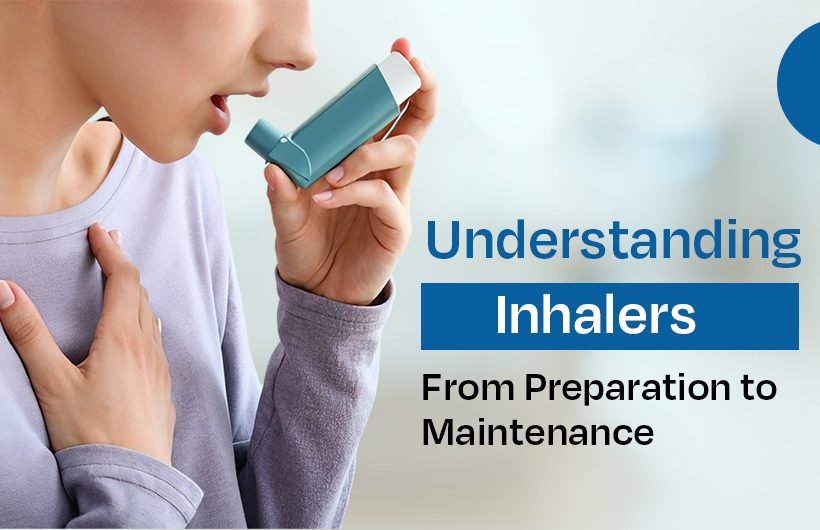Inhalers are a lifeline for individuals managing respiratory conditions such as asthma, chronic obstructive pulmonary disease (COPD), and other lung disorders. These devices deliver medication directly into the lungs, providing quick relief and effective management of symptoms. Despite their importance, many people do not fully understand the various types of inhalers, their specific uses, or how to correctly care for them.
In this guide, Dr. Rushi Desai, a reputed pulmonary doctor in Ahmedabad, sheds light on the essentials of inhalers, including their types, correct usage, and maintenance, ensuring you get the maximum benefit from your inhaler therapy.
What Are Inhalers Used For?
Inhalers are medical devices designed to deliver medication directly into the lungs. They are primarily used to manage and treat respiratory conditions, including:
1. Asthma: Inhalers help open the airways, reduce inflammation, and quickly relieve symptoms such as wheezing, coughing, and shortness of breath.
2. Chronic Obstructive Pulmonary Disease (COPD): Inhalers assist in improving airflow and managing symptoms like breathlessness and chronic cough.
3. Allergic Reactions: Certain inhalers can alleviate respiratory symptoms caused by allergies.
4. Other Respiratory Disorders: Bronchitis, cystic fibrosis, or emphysema may also require inhaler therapy.
Consulting a pulmonary clinic near me can help determine the suitable inhaler and treatment plan based on your condition.
Types of Inhalers
There are several types of inhalers, each customized to specific needs. Understanding the differences can help you choose the right one under the guidance of a healthcare professional.
1. Metered-dose inhalers (MDIs)
- How They Work: MDIs release a specific dose of medication in aerosol form.
- Best For: People with asthma or mild respiratory conditions.
- Usage: Often requires a spacer to ensure medication reaches the lungs effectively.
2. Dry Powder Inhalers (DPIs)
- How They Work: Deliver medication in the form of a dry powder.
- Best For: Patients who inhale quickly and deeply, as these inhalers rely on the user’s breath to activate the medication.
3. Soft Mist Inhalers
- How They Work: Produce a fine mist for better absorption in the lungs.
- Best For: People with chronic respiratory issues require consistent, long-lasting medication delivery.
4. Nebulizers
- How They Work: Convert liquid medication into a mist for inhalation.
- Best For: Severe respiratory conditions or patients who struggle with traditional inhalers.
Understanding the types of inhalers and their specific uses is vital. Your pulmonary doctor in Ahmedabad can recommend the most suitable option based on your symptoms and lung condition.
How to Use an Inhaler Properly
The effectiveness of inhalers depends on correct usage. Incorrect techniques can lead to inadequate medication delivery, reducing their benefits. Follow these steps for optimal results:
1. Preparation
- Shake the inhaler if required (especially for MDIs).
- Prime the inhaler if it is new or hasn’t been used for a while. This ensures the correct dose is delivered.
2. Positioning
- Hold the inhaler upright.
- Tilt your head slightly back to open your airways.
3. Inhalation
- Breathe out fully to empty your lungs.
- Place the inhaler mouthpiece between your teeth and close your lips around it.
- Press the inhaler and at the same time inhale deeply through your mouth.
- Hold your breath for 10 seconds to allow the medication to settle in your lungs.
4. Rinse Your Mouth (If required)
- If your medication contains steroids, rinse your mouth with water to prevent irritation or infections.
Maintenance and Care for Your Inhaler
Proper maintenance ensures your inhaler remains effective and hygienic. Neglecting care can lead to blockage, reduced medication delivery, or bacterial buildup.
1. Clean Your Inhaler Regularly
- Remove the canister (for MDIs) and rinse the mouthpiece under warm water.
- Let it dry completely before rebuilding.
2. Store in a Safe Place
- Keep your inhaler at room temperature, away from direct sunlight or moisture.
- Avoid exposing it to extreme heat or cold.
3. Check Expiration Dates
- Regularly check the expiration date and replace the inhaler if it’s expired.
4. Monitor Dosage Counters
- Some inhalers have built-in dose counters. Keep track of remaining doses and refill your prescription on time.
If you have concerns about maintaining your inhaler, consult a pulmonary clinic near me for professional advice.
Common Challenges and Tips for Overcoming Them
Many individuals face challenges with inhaler usage. Here are some common problems and solutions:
1. Difficulty Coordinating Breathing with Activation
- Use a spacer with MDIs for better coordination.
- Practice under the supervision of a respiratory surgeon in Ahmedabad.
2. Uncertainty About Dosage
- Follow your doctor’s direction closely.
- Schedule regular check-ups to assess your medication needs.
3. Fear of Side Effects
- Discuss any concerns with your pulmonary doctor in Ahmedabad. Adjustments can be made to minimize side effects.
Inhalers for Asthma and Beyond
Inhalers play a crucial role in managing asthma and other respiratory disorders. They provide relief during asthma attacks, control swelling, and improve lung function over time. If you’re unsure whether you need an inhaler, consult a pulmonary clinic near me for a detailed evaluation.
The Role of Pulmonology Specialists
A qualified pulmonologist, Dr. Rushi Desai, offers expert guidance in diagnosing and managing respiratory conditions. Here’s how a pulmonologist can help:
- Assess your lung function and prescribe the right inhaler.
- Provide training for inhaler techniques.
- Address any complications or side effects.
- Monitor your progress and adjust medications as needed.
Visiting a respiratory surgeon in Ahmedabad or a well-equipped pulmonary clinic ensures comprehensive care for your lung health.
Conclusion
Inhalers are indispensable tools for managing respiratory conditions like asthma, COPD, and other lung disorders. Understanding the types of inhalers, their proper use, and maintenance is key to maximizing their benefits. With the support of a trusted pulmonary doctor in Ahmedabad, such as Dr. Rushi Desai, you can effectively manage your symptoms and improve your quality of life.
Whether you need an asthma inhaler or specialized care for a chronic respiratory condition, visiting a pulmonary clinic near me ensures you receive personalized treatment and expert advice. Take charge of your inhaling health today for a healthier, more active tomorrow!






